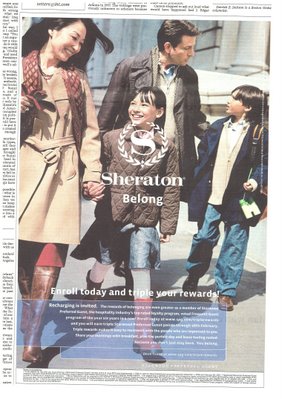It's huge, peach-colored, steaming and smells to high heaven.
Is it
James's Giant Peach after a series of unfortunate events involving a rogue U.S. microwave relay satellite?
No, it's the
Financial Times's portulent (a neologism, forget about the dictionary here) interview
cum hagiography of Watanabe Tsuneo.
Japan's top daily forces war reappraisal
Financial Times
By David Pilling - Published: December 27 2006 - Pinpointing the true source of power in Japan is a notoriously slippery task. In a society where decisions tend to emerge through a drawn-out process of consensus, even prime ministers are sometimes little more than figureheads, articulating policies engineered by anonymous others deep in the bowels of the body politic.
One man, however, who has enjoyed undisputed influence is Tsuneo Watanabe, now 80, chairman and editor-in-chief of the Yomiuri newspaper, which with a circulation of 10m is the world's largest daily. Mr Watanabe, who took charge of the Yomiuri empire in 1991 after starting as a political reporter, has long had the ear of prime ministers, business leaders and elite bureaucrats, including other "shadow shoguns" who have helped shape Japan.
The country's most powerful media executive, who is also the force behind the Yomiuri Giants, the nation’s most successful baseball team, has wielded his enormous influence to promote a consistently conservative agenda.
The wealth he has amassed, unusual for someone who worked up the ranks as a reporter, has invited criticism; so have the uses to which he has put his power, which some argue have lent respectability to the strident nationalism heard increasingly in Japan these days. His causes have included a long public campaign, now closer to fruition than ever, to rewrite the postwar pacifist constitution. His newspaper has been a champion of Japan's armed forces and an advocate of the country standing taller in international affairs.
This made all the more remarkable a recent about-face by Mr Watanabe, often referred to as "God" by his awestruck underlings at the Yomiuri. It began in 2005 when the Yomiuri shook the political establishment by decrying in an editorial the visits of Junichiro Koizumi, then prime minister, to Yasukuni shrine, where 2.5m war dead, including 14 Class A war criminals, are honoured. Those visits were unnecessarily provocative to China and showed a wilful ignorance of Japan's dark wartime history, the newspaper thundered.
"Awestruck"...""thundered"..."the force"..."anonymous others deep in the bowels of the body politic"
"Bowels of the body politic"...isn't that where you find a lot of...well, it rhymes with "tit"?
Anyway, isn't way cool when you get to interview God? And not the Western God guy on the Sistine Chapel ceiling and the t-shirts. That God is so déclassé and banal.
No, this is a super-cool hidden god, only for those of us in the know (Isn't great to be part of the hip, super-beautiful elite? Like you would not believe what minor functionaries in the North Korean apparat say to me when their superiors are not around. Give up our nuclear program for economic aid and security guarantees? Not!)
No this super-slippery (?) post-Akira-like Nippono God manifests itself in a visage like unto a
Nihon ishigame (
Mauremys japonicus) after
a minor fender bender.
All right now, give me a break.
1) Watanabe Tsuneo is yesterday. If he weren't, he wouldn't be reaching for the microphone and mugging for the cameras every single bloody day. That he is talking
ad nauseum to foreign reporters is
prima facie evidence of his dimished stature.
2) The
Yomiuri Shimbun's sudden onslaught of conscientiousness has nothing to do with conscience and everything to do with Watanabe's hating Koizumi Jun'ichiro's guts, hair and everything that is attached to them.
The paper's servility toward the Abe Cabinet, complimenting it, encouraging it when it takes a hit, is a slouch toward relevance through sycophancy. It is also rank, rank, rank.
3) The
Yomiuri's review of history is not ground breaking, nor is it particularly influential. Frankly, no one gives a...uh, we talked about what it rhymes with above.
This purportedly hard-hitting and deep examination of the war's origins finds that the Emperor was not responsible because "he was routinely deprived of information about the progress of the war, while his attempts to discuss peace options were roundly ignored."
"Deprived of information?"
What, he couldn't order out for a newspaper?
"His attempts to discuss peace options were roundly ignored?"
He couldn't tell anyone important to sit down, shut up and listen, not even after the Shitamachi and 100,000 of its inhabitants were incinerated in a night?
How bloody convenient that he somehow neither tried to find out what was going on nor succeeded in speaking firmly to anyone (nice horsemanship, though).
"If anything, the Yomiuri has been more damning than the Tokyo Tribunal"
Horse feathers!!! Beaver biscuits!!!
4) It is true: I am not amused by Mr. Watanabe's cynical grab for a role in 21st century politics. His flouncing about with the publisher of the
Asahi Shimbun, pretending they were best friends forever, was hideous.
Shame on anyone believing a damn thing that comes out squawking out of
Nabetsune's beak.
Later - For the person who wrote asking when I am posting on Honma, I beg a little more of your patience.















